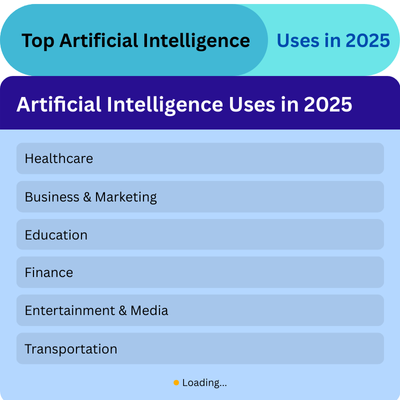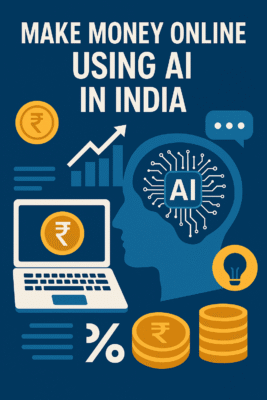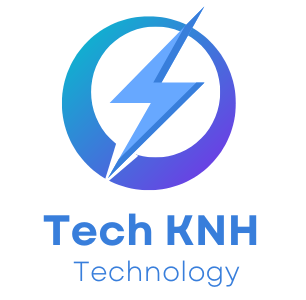Top 10 Most Powerful AI Technology Trends 2025 You Need to Know
Top 10 Most Powerful AI Technology Trends 2025 You Need to Know
Top 10 Most Powerful AI Technology Trends 2025 You Need to Know
AI technology trends 2025
1. Healthcare
- AI Diagnostics: AI models like GPT-4 and Med-PaLM assist doctors in diagnosing diseases faster and more accurately.
- Drug Discovery: AI speeds up drug research using protein folding predictions and molecule simulations.
- Virtual Health Assistants: Chatbots help patients manage medication schedules, symptoms, and doctor appointments.
- Robotic Surgery Assistants: AI-guided robots enhance precision during complex surgeries.

2. Business & Marketing
- AI Copywriting: Tools like Jasper, Copy.ai, and ChatGPT write ad copies, blogs, emails, and product descriptions.
- Customer Support Chatbots: 24/7 AI-driven support agents handle FAQs, returns, and queries without human input.
- Data Analytics: AI helps companies predict trends, customer behavior, and market movements using massive datasets.
- Fraud Detection: AI detects suspicious financial activity and patterns in real time.
3. Education
- Personalized Learning: AI tailors course material to each student’s learning style and pace.
- AI Tutors: Virtual tutors explain topics, solve doubts, and help with homework and exam prep.
- Automated Grading: Teachers use AI tools to grade assignments and assess student performance quickly.
- Language Learning Assistants: Tools like Duolingo use AI to customize and enhance language practice.
4. Finance
- Robo-Advisors: AI tools help investors create and manage portfolios based on goals and risk levels.
- Stock Market Prediction: AI analyzes patterns and news to give insights for stock trading.
- Expense Tracking & Budgeting: Apps like Cleo and YNAB use AI to guide users on saving and spending.
- Loan Approval Systems: AI evaluates credit scores and personal data to approve or reject loan applications instantly.
5. Entertainment & Media
- AI Video & Music Generation: AI tools like Sora and Suno create realistic videos and songs.
- Game Development: AI assists in creating realistic NPCs, game levels, and storylines.
- Content Recommendations: Netflix, YouTube, and Spotify use AI to suggest what users will likely enjoy next.
- Deepfake & Voice Cloning: AI recreates celebrity voices, faces, or historical figures in media and marketing.
6. Transportation
- Self-Driving Cars: Companies like Tesla, Waymo, and Apple use AI for autonomous driving.
- Smart Traffic Control: AI reduces congestion by managing traffic lights and analyzing city traffic patterns.
- AI in Aviation: AI co-pilots assist pilots with flight navigation, weather forecasts, and route optimization.
- Logistics & Delivery Drones: AI-powered drones and robots deliver goods in cities and remote areas.
7. Smart Homes & IoT
- Voice Assistants: Alexa, Google Assistant, and Siri now understand context better and offer deeper interactions.
- AI Security Systems: Smart cameras detect unfamiliar faces and suspicious activities instantly.
- Energy Management: AI adjusts heating, lighting, and cooling based on presence and preferences.
- Smart Appliances: Fridges, washing machines, and ovens learn your routine and optimize energy usage.
8. Agriculture
- Precision Farming: Drones and sensors powered by AI monitor crop health and suggest exact watering/fertilizer needs.
- Crop Yield Prediction: AI models predict how much harvest to expect based on soil, weather, and past data.
- Pest Detection: Computer vision AI tools detect early pest infestations before damage spreads.
9. Cybersecurity
- Threat Detection: AI identifies potential cyberattacks and security breaches in real-time.
- Behavioral Biometrics: AI tracks user behavior to detect if an account is being accessed by someone unauthorized.
- Phishing & Spam Filters: Email systems use AI to spot and block scams before they reach the inbox.
10. Human Resources & Hiring
- Resume Screening: AI filters applicants based on experience, skills, and fit using natural language processing.
- Interview Bots: AI conducts initial interviews and evaluates voice tone, response quality, and honesty.
- Employee Sentiment Analysis: AI gauges company morale by analyzing communication data (emails, chats, surveys).
🚀 AI technology trends 2025
Future Trends in 2025 and Beyond
- AI Co-Workers: Virtual agents work alongside humans in content creation, code writing, and customer service.
- Autonomous Robots: In factories, agriculture, and delivery — performing complex, repetitive tasks.
- AI Legal Advisors: AI offers legal consultation and document drafting for simple legal issues. more details
AI technology trends 2025
AI technology trends 2025

"Artificial Intelligence 2025 – Insights, Tools & Innovations"
"AI 2025: Future Tech, Trends & Real-World Impact"


The advancements in AI by 2025 seem promising but also raise concerns about ethical implications and job displacement. It’s fascinating how AI will reshape industries like healthcare and finance, but we must ensure it benefits everyone, not just a select few. The potential for AI to enhance creativity and innovation is undeniable, yet we can’t ignore the risks of misuse. How do we strike a balance between progress and responsibility? I wonder if there will be enough regulations in place to prevent biases in AI systems. What role will public opinion play in shaping these trends? Do you think we’re ready for such rapid changes, or is society still lagging behind?
This is an interesting topic! AI is evolving so rapidly, and it’s fascinating to think about where it will be by 2025. I wonder which specific trends will have the biggest impact on industries like healthcare or education. Do you think AI will become more accessible to smaller businesses, or will it remain dominated by tech giants? It’s also exciting to consider how AI might improve daily life, but I’m curious about the ethical challenges that might arise. How do you think we can balance innovation with responsibility? What’s your take on the potential risks and rewards of these trends?
This is an intriguing topic! The advancements in AI by 2025 seem both exciting and a bit overwhelming. I wonder how these trends will impact everyday life—will they make things easier or more complicated? It’s fascinating to think about the ethical considerations that come with such rapid development. Do you think society is ready for these changes, or will there be significant pushback? I’m particularly curious about how AI will influence industries like healthcare and education. What’s your take on the balance between innovation and potential risks? Would love to hear your thoughts!